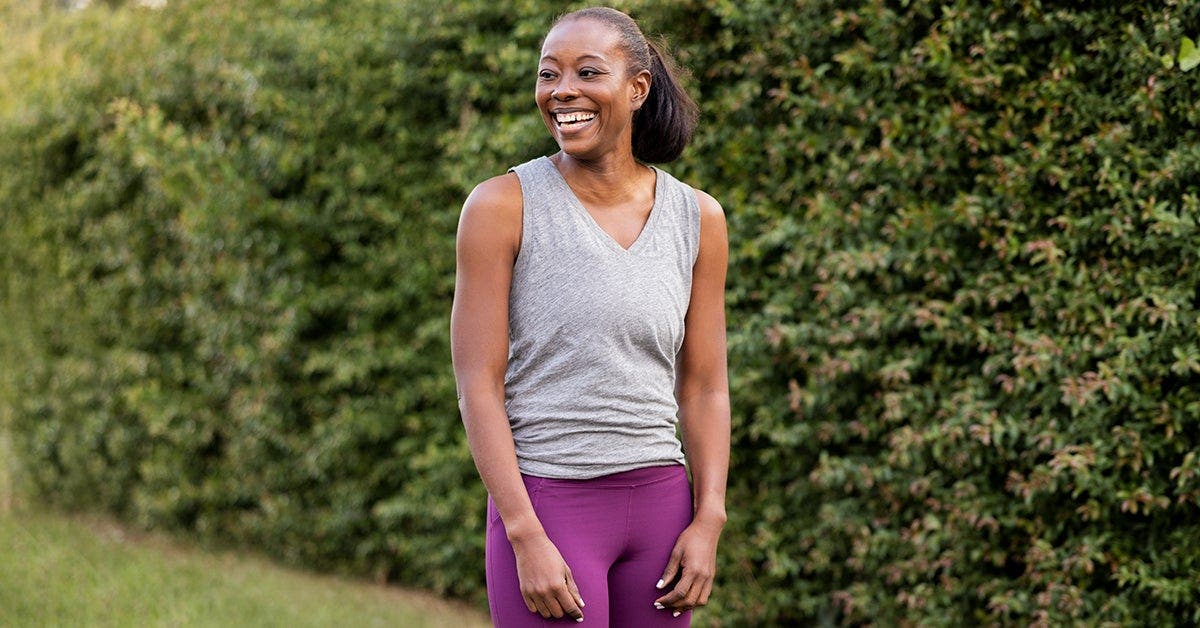Outdoor Walking Tips: 7 Ways to Beat Boredom on Your Walks
Boredom-proof your outdoor walks
Get your steps in and stay inspired with these creative ideas from fitness trainers.

For busy folks who don’t have access to fancy gym equipment, one of the best workout options is often a good old-fashioned neighborhood walk. Logistically, it makes sense: A local walk doesn’t require travel or special gear, which makes ducking out for exercise easy—well, relatively easy, anyway. And those strolls can be great for health. Walking briskly has been linked to reductions in body weight, BMI, and waist circumference, along with lowered risk of type 2 diabetes, high blood pressure, heart disease, and more. Not to mention a boost in mood.
Shocked? Don’t be. Activity doesn’t need to “look” a certain way—or leave you dripping with sweat—to be effective, explains personal trainer Christi Smith, M.S., certified strength & conditioning specialist and associate manager of science translation at WeightWatchers®.
At the same time, however, many outdoor walkers wrestle with boredom. Once you’ve trekked the same path a few (hundred) times, how do you maintain interest? WW spoke with top trainers for some inspiration.
Tips for making outdoor walks more interesting
Add fresh moves.
No need to map out a new route to break your rut. Charlee Atkins, CSCS, a New York City-based personal trainer and founder of the virtual fitness company Le Sweat, recommends mixing up steps with higher-intensity moves for variety. For example, try power-walking as quickly as you can for 30 seconds, then drop back to your regular pace for a minute. Repeat for the duration of your walk. Or, pause for a quick set of lunges or jumping jacks every few minutes, says Albert Matheny, MS, RD, CSCS, co-founder of SoHo Strength Lab in New York City. In addition to fighting boredom, adding high-intensity intervals to a moderate workout may boost the cardiovascular benefits, according to a 2016 analysis in the Journal of Physiology.
Think chapters instead of steps.
Measuring strolls in steps, miles, or minutes can start to feel like drudgery after a while. In that case, Atkins says you may have more fun marking the distance with help from podcasts and audiobooks. Instead of, say, vowing to trek 2 miles, commit to a walk that’s “one chapter long," or try trekking for a 30-minute episode of your favorite podcast.
Practice mindfulness.
Good news for the 99.999% of us who’ve been feeling on edge lately: Merging a walk with meditative practices may help dial down stress, according to a 2013 study of 74 “high-stress” adults. Mindful walking often includes focusing on breaths, keying in to physical sensations—such as the feeling of a breeze on your face—and directing thoughts to the present moment.
Play photographer.
Snapping pictures along your walk can be a fun way to spark your creativity and see your surroundings with fresh eyes. Try assigning yourself a theme: Today, for example, try photographing as many types of flowers as you can find; next week, maybe point your lens at songbirds, or head out during golden hour to capture that amazing light.
Pump your playlist.
This tip is for you if you tend to lose steam on your walks: A small 2015 study suggests that listening to favorite music may not only heighten overall enjoyment of a workout; that enjoyment may actually rise as the workout goes on. Atkins recommends choosing songs with upbeat tempos—170–190 beats per minute or so—which may nudge you to maintain intensity, according to a February 2020 study of 19 women published in Frontiers in Psychology.
Tweak your timing.
If your schedule allows, heading out at a different time of day may revive your walking mojo. For instance, if you typically stroll in late afternoon, try first thing in the morning instead—your favorite trail may look a lot different when it’s sparkling with dewdrops and early light. If your walking route is circular, another idea is to walk in the reverse direction from your norm. Seeing the sights from another angle may inspire newfound appreciation for them.
Reach out.
Been meaning to check in on a relative or a friend lately? Use your next solo walk as a chance to call and catch up. Free of household distractions, you’ll likely be better able to tune in to the conversation than you would otherwise. Know of a friend who lives along your route? Tell them you’ll be passing by so they can wave or say hi out the window, giving you a mini social boost to look forward to as you get those steps in.
